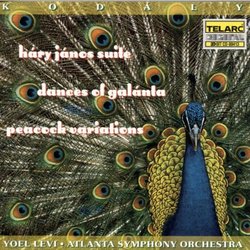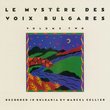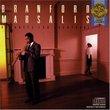| All Artists: Zoltan Kodaly, Yoel Levi, Atlanta Symphony Orchestra Title: Kodály: Háry János Suite; Dances of Galánta; Peacock Variations Members Wishing: 0 Total Copies: 1 Label: Telarc Release Date: 11/12/1996 Genres: Dance & Electronic, Classical Styles: Ballets & Dances, Dances, Historical Periods, Modern, 20th, & 21st Century Number of Discs: 1 SwapaCD Credits: 1 UPC: 089408041327 |
Search - Zoltan Kodaly, Yoel Levi, Atlanta Symphony Orchestra :: Kodály: Háry János Suite; Dances of Galánta; Peacock Variations
 | Zoltan Kodaly, Yoel Levi, Atlanta Symphony Orchestra Kodály: Háry János Suite; Dances of Galánta; Peacock Variations Genres: Dance & Electronic, Classical
![header=[] body=[This CD is available to be requested as disc only.]](/images/attributes/disc.png?v=430e6b0a) ![header=[] body=[This CD is available to be requested with the disc and back insert.]](/images/attributes/disc_back.png?v=430e6b0a) ![header=[] body=[This CD is available to be requested with the disc and front insert.]](/images/attributes/disc_front.png?v=430e6b0a) ![header=[] body=[This CD is available to be requested with the disc, front and back inserts.]](/images/attributes/disc_front_back.png?v=430e6b0a) |
Larger Image |
CD DetailsSimilar CDs
Similarly Requested CDs
|
CD ReviewsA Very Fine Kodaly Program M. C. Passarella | Lawrenceville, GA | 08/15/2005 (5 out of 5 stars) "I find these to be very sensibly paced and articulated interpretations of three of Kodaly's most popular works. The most important work, "The Peacock Variations," is sometimes dismissed as indicative that Kodaly's growing conservatism had turned largely academic, that the composer was more interested in an exploration of musical form than of the Hungarian folk music that inspired the piece. I don't see it that way. Certainly, the Variations aren't breathtakingly innovative in the manner of the Unaccompanied Cello Sonata. On the strength of this latter composition and others of the teens, one might have supposed Kodaly would have developed into another Bartok, an uncompromising modernist who so internalized the Hungarian folk musical idioms as to create a whole new musical language, a language with few imitators. Instead, Kodaly did become much more conservative than Bartok--or rather Bartok's conservative, more listener-friendly phase came later than Kodaly's. (It should be remembered that music critics at first didn't forgive Bartok either for his growing conservatism.) But conservative in idiom or not, the Variations are emotionally very satisfying, progressing from the early variations in which Kodaly seems content to pit different rhythms against one another, to the humorous faux orientalism of Variation X, to the increasingly somber and even tragic Variations XI and XII, musical high point of the work. These variations are followed, logically, by the funeral march of Variation XIII and the mysterious and emotionally equivocal Variation XIV. Short, swift Variation XV is little more than a bridge to the grand maestoso of Variation XV. This variation seems to me a musical picture of resolution and an obvious prelude to the life-affirming finale. While there is no obvious program here, written as they were at the beginning of World War II, the Variations are a message of obvious hope for Kodaly's own oppressed nation. As I say, Levi takes an entirely sensible approach to the music, scrupulously following Kodaly's tempo markings. So Levi's Variation XV is maybe a little broader than I've heard it done by some conductors, but it is a true maestoso, and this has its obvious benefits, especially as contrast to the vivace of the finale. The Atlanta Symphony responds well to his lead, the brass emphasizing the dissonances in Variation XII to give it an even more unsettling quality. Much the same can be said for the other pieces on this disc. In the Galanta Dances, Levi builds very convincingly to the Gypsy whirlwind that is the final dance in the series. And while I've never heard a bad performance of the crowd-pleasing Suite from Hary Janos, Levi's is suitably colorful and dynamic. Again, the Atlanta Symphony does an admirable job, catching well the note of gentle sarcasm in this music, especially in the Battle and Defeat of Napoleon. Fine, clear sound with plenty of oomph in the best Telarc manner." Kodaly Compilation Brett A. Kniess | Madison, WI | 10/10/2005 (4 out of 5 stars) "Here on one CD are three of Zoltan Kodaly's most famous works. Along with Bela Bartok, Kodaly implements modes and rhythms from his homeland and incorporates them into his concert music in an interesting and unique manner.
The Hary Janos Suite comes off especially well on this CD. Here is a tale of a war hero who boasts his deeds in life and his many adventures. Of particular note is the famous Viennese Musical Clock, the defeat of Napoleon, and the Entrance of the Emporer. The folk instrument cimbalon is the star in this work and it is equally balanced with the orchestra, along with the inclusion of the saxophone give this work a "folksy" feel. Dances of Galanta has a great drammatic breadth as well as quirky dance sections alternating between the two fast/slow styles. The dances erupt into an apotheosis of sound taken at whirlwind speeds, and abruptly link into the quiet sections. The Peacock Variations takes a melody (not a very good one I must admit) and puts it through various orchestral treatments. Variations I-X are rather more upbeat, while a great melancholy falls over Variations XI-XVI. The finale brings back the upbeat tempos for a rousing conclusion. The performances by the Atlanta Symphony Orchestra are lush and romantic, just what this music calls for. Yoel Levi did his homework on these pieces and give each as "authentic" a performance as the Atlantian's possibly could. He perhaps langors too long on the slow parts of the Peacock, but that can be taken with a grain of salt since Levi is trying to evoke a more song-like feeling. In any case, having these great works on one CD is an offer I couldn't refuse. 1st rate recording and performance. For a cheaper option, check out the Dances and Variations on Naxos, and compare this CD to a rousing interpretation of the Hary Janos Suite on Philips with Ivan Fischer and the Budapest Festival Orchestra." |

 Track Listings (25) - Disc #1
Track Listings (25) - Disc #1













